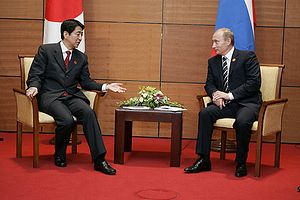While we here at The Diplomat have been giving extensive coverage to the ongoing APEC Summit, and particularly the brief meeting between President Xi Jinping and Prime Minister Shinzo Abe, Japan has managed to significantly engage another Asian ally: Russia. Abe met with President Vladimir Putin on Sunday, in what was by all accounts a much friendlier and more productive exchange. The two leaders continued to walk a fine line between improving their ties without upsetting their domestic populations (Russia) or allies (Japan), during cordial talks that ran to twice their allotted time of 45 minutes.
One important item on their agenda was a rescheduling of Putin’s visit to Tokyo. The president had been set to come this fall, but the ongoing conflict in Ukraine made Japan call off the meeting in order not to upset its G7 allies, particularly the U.S. While an official date has not been set, the Yomiuri Shimbun reported that the leaders “have agreed that both countries will make preparations for Putin’s visit to Japan at an appropriate time next year.”
The main bilateral issue discussed concerned the resolution of a dispute over four of the Kuril Islands between Russia and Japan’s island of Hokkaido. After a joint statement in April 2013, the two sides have agreed to work toward a settlement. The leaders on Sunday said these negotiations would accelerate, with the stipulation that “the two nations would find a solution acceptable to both sides.”
Ukraine continues to be the issue that is holding up substantial progress between Tokyo and Moscow. As Takayuki Tanaka at the Nikkei points out, Japan had initially expected the crisis in the Ukraine to gradually resolve itself. However, the November 2 elections held by pro-Russian rebels in Donetsk and Luhansk caused the U.S. to express “concerns ahead of Sunday’s meeting that a Japanese visit by Putin could weaken the pressure by the Group of Seven countries on Russia.” Consequently, Abe brought up the election issue with Putin during their meeting, saying it “complicated” their situation while urging Moscow to help facilitate the ceasefire between Ukraine’s government and its rebels.
Ukraine has hampered Russo-Japanese relations for most of this year, and the crisis is not showing signs of resolution. Pushing Putin’s visit to Japan further down the road is an optimistic proposal, and one that may have to continue for some time. As Japan’s foreign policy is still strategically tied to the U.S., it cannot afford to make a substantial break over Ukraine. Likewise, Russia cannot afford to make significant concessions to a country that is currently sanctioning it, as nationalism over the Ukraine issue has spiked significantly. Any real bilateral progress will be in limbo until the crisis in Ukraine stabilizes.































